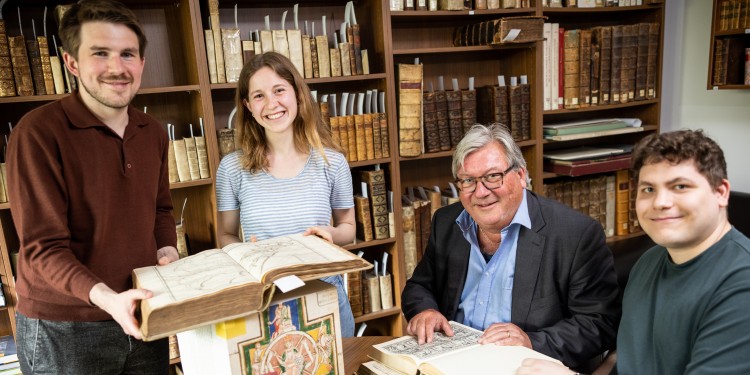
More methodologies, better possibilities, greater insights
Visit Münster University’s Department of Latin Philology of the Middle Ages and the Early Modern Period on the third floor of Bogenstraße 15/16, not far from Prinzipalmarkt, and you’ll find yourself standing between dark brown bookshelves reaching up to the ceiling. You immediately notice a large desk with chairs: an entirely usual picture for a library – and one that perfectly suits the master’s course in “Interdisciplinary Medieval Studies” (IMAS) which is based there and which links up the subjects of History, Philosophy and Philology and brings them together – literally – round a table. Anyone enrolling for this course learns a lot, from several angles, about textual scholarship, oral and written traditions, history and cultural history in the period from 500 to 1500 CE. “We are convinced that it is important to examine the cultural history of the Middle Ages in an interdisciplinary way,” says Prof. Karl Enenkel, Director of Studies and holder of the Chair of Latin Philology of the Middle Ages and the Early Modern Period at the University of Münster. “Only when we combine different disciplines such as book history, rhetoric, codicology and art history can we obtain a comprehensive view of various phenomena.”
The IMAS master’s course at Münster University has been on offer since 2010. It is of particular interest for those students who have gained their bachelor’s degree in German Studies, History or Latin Philology, for example. The aim of the course is to equip students with competences in medieval cultural studies. The three core subjects are Medieval Latin Philology, Medieval History and Medieval German Language and Literature. In addition, students can choose from a large number of other subjects such as Arabic Studies, Musicology or Legal History, depending on their individual preferences. In the teaching and practical sessions, the focus is on handling material passed down from the Middle Ages. How was written material produced in the Middle Ages? How was it passed down? And how is it conserved today? Which everyday items can provide information about certain aspects of life in the Middle Ages?
“I already knew quite early on in my studies that the Middle Ages was the period for me,” says Hannah von Legat, who is taking a master’s course in History parallel to the IMAS course. “I noticed that I had a lot of gaps in my knowledge which I could only fill by looking at topics from different angles.” The interdisciplinary collaboration is reflected in the teaching, she says. “There’s always a broad mix of students in our seminars – bringing together students of German, Theology and History, for example,” adds Luca Hollenborg, who, besides doing the master’s in IMAS, is studying to be a teacher of German and History. It is precisely this aspect which is close to Karl Enenkel’s heart. “I am convinced that this interdisciplinary approach points to the future. We can only research into medieval life by adopting a broad range of methodologies,” he says.
The philosophy behind the IMAS course is also reflected in its organisation. “We consciously aim to allow our students to select their own individual focus,” says course coordinator Lukas Reddemann. Only around 20 students are taking the course, making it one of the smaller ones at Münster University, and much importance is attached to providing advice and support to each individual student. There are also regular opportunities for exchanges with others – for example in a colloquium, in which students can present their master’s thesis, or on excursions. The competences which the students acquire are intended firstly to train junior researchers and smooth the way for research-oriented work at universities. And secondly, the master’s degree presents an opportunity to find a career working in archives, libraries, museums, PR work and other fields of activity involving cultural education.
“We are a small course, and it is one which is close to everyone’s heart,” as Hannah von Legat explains. “Medieval studies interest us, and we’re also passionate about the subject in our free time,” adds Luca Hollenborg. This passion is underlined, not least of all, by the IMAS students’ regular meetings outside the course: twice a month they come together – without those dark brown bookshelves around them – and sit round a table and discuss their research interests in an interdisciplinary way.
Author: Kathrin Nolte
This article is from the university newspaper wissen|leben No. 4, 7 June 2023.
